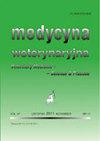Mutations and polymorphisms in mitochondrial genome of dogs with solid mammary carcinoma – a preliminary study
IF 0.4
4区 农林科学
Q4 VETERINARY SCIENCES
Medycyna Weterynaryjna-Veterinary Medicine-Science and Practice
Pub Date : 2023-01-01
DOI:10.21521/mw.6821
引用次数: 0
Abstract
In recent years, the association between mitochondrial DNA (mtDNA) changes and tumorigenesis has been discussed. In contrast to human medicine, there are still few studies on the molecular basis of canine tumors. One of the most commonly diagnosed, solid mammary carcinoma, is characterized by its aggressiveness, difficult treatment, and generally poor prognosis. The aim of the study was to reveal mutations and polymorphisms in mtDNA in dogs with solid mammary carcinoma and to determine the relationship of these changes with the process of neoplastic transformation. Blood, healthy tissue, and neoplastic tissue samples were collected from two crossbreed dogs diagnosed with G3 and G2 solid mammary carcinoma. Subsequently, for the first time, Next Generation Sequencing (NGS) was used to analyze the whole genome mtDNA of dogs with solid mammary carcinoma. Thus, bioinformatic analyses included all 37 mitochondrial genes. As a result, 10 polymorphisms and 20 mutations were identified. Most polymorphisms/mutations were found in the dog with the more advanced stage of the disease (G3). Twelve of the thirty changes identified have not been described in the literature so far. These include eleven mutations in COX2 (m.7308A>G), ATP6 (m.8536C>T), ND4L (ins.9913_9914AG, ins.9913_9914TG, m.10165C>T), ND4 (m.10204C>T), CYTB (m.16248A>G, m.16268A>G), D-loop (m.16378G>A, m.16408G>A, m.16507T>A) which may be related to canine tumorigenesis.犬实性乳腺癌线粒体基因组突变与多态性的初步研究
近年来,人们对线粒体DNA (mtDNA)变化与肿瘤发生的关系进行了讨论。与人类医学相比,对犬肿瘤分子基础的研究仍然很少。其中最常见的诊断,实性乳腺癌,其特点是其侵袭性,治疗困难,一般预后差。本研究的目的是揭示实体乳腺癌犬mtDNA的突变和多态性,并确定这些变化与肿瘤转化过程的关系。本文采集了两只诊断为G3和G2实性乳腺癌的杂交犬的血液、健康组织和肿瘤组织样本。随后,我们首次利用下一代测序技术(NGS)分析了实性乳腺癌犬的全基因组mtDNA。因此,生物信息学分析包括所有37个线粒体基因。结果,鉴定出10个多态性和20个突变。大多数多态性/突变发生在疾病晚期(G3)的狗身上。这30种变化中有12种至今尚未在文献中描述过。其中包括COX2 (m.7308A>G)、ATP6 (m.8536C>T)、ND4L (m.8536C>T)的11个突变。9913 _9914ag, ins。9913_9914TG, m.10165C>T), ND4 (m.10204C>T), CYTB (m.16248A>G, m.16268A>G), D-loop (m.16378G>A, m.16408G>A, m.16507T>A),可能与犬肿瘤发生有关。
本文章由计算机程序翻译,如有差异,请以英文原文为准。
求助全文
约1分钟内获得全文
求助全文
来源期刊

Medycyna Weterynaryjna-Veterinary Medicine-Science and Practice
VETERINARY SCIENCES-
CiteScore
0.80
自引率
0.00%
发文量
73
审稿时长
4-8 weeks
期刊介绍:
"Medycyna Weterynaryjna" publishes various types of articles which are grouped in the following editorial categories: reviews, original studies, scientific and professional problems, the history of veterinary medicine, posthumous memoirs, as well as chronicles that briefly relate scientific advances and developments in the veterinary profession and medicine. The most important are the first two categories, which are published with short summaries in English. Moreover, from 2001 the editors of "Medycyna Weterynaryjna", bearing in mind market demands, has also started publishing entire works in English. Since 2008 the periodical has appeared in an electronic version. The following are available in this version: summaries of studies published from 1999 to 2005, full versions of all the studies published in the years 2006-2011 (in pdf files), and full versions of the English studies published in the current year (pdf). Only summaries of the remaining studies from the current year are available. In accordance with the principles accepted by the editors, the full versions of these texts will not be made available until next year.
All articles are evaluated twice by leading Polish scientists and professionals before they are considered for publication. For years now "Medycyna Weterynaryjna" has maintained a high standard thanks to this system. The review articles are actually succinct monographs dealing with specific scientific and professional problems that are based on the most recent findings. Original works have a particular value, since they present research carried out in Polish and international scientific centers.
 求助内容:
求助内容: 应助结果提醒方式:
应助结果提醒方式:


